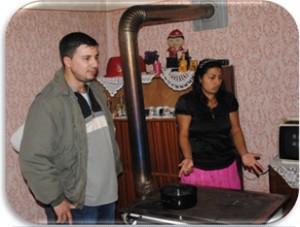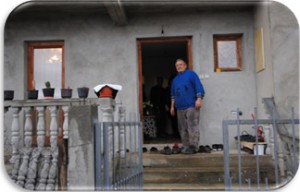
Orhan and Mersiha Kurtesi, Nova Crnja, 15 December 2010
“After having spent nearly 10 years in a collective center, we are now starting a new life. I am happy, although I know it will be difficult, but I have a hairdressing apprenticeship and some savings to start a business here in Nova Crnja to provide a decent life for my family” said Orhan Kurtesi. Orhan and Mersiha Kurtesi recently bought a house near Zrenjanin with the help of the UN PBILD programme, and moved in with their five-member family.
Along with Orhan’s and Mersiha’s family, three other families have left the Bujanovac ‘Salvatore’ collective centers and bought houses in Nova Crnja. During the summer they applied for the PBILD housing assistance package – ‘village house’ purchase grant worth 620,000 RSD – one of the three sets of assistance packages that PBILD offers to internally displaced persons (IDPs) and refugees in southern Serbia. The purpose of the PBILD assistance is to support IDPs leaving collective centers and helping to provide sustainable accommodation solutions.
Ljiljana Jovanovic, who moved with her family into a village house bought in Nova Crnja, says that they are very happy with the assistance that PBILD provided. “The first thing I want to do in spring is to plant something here and take up agriculture. We have plenty of land around the house and I want to grow potatoes, sell some and keep the rest for us. But most importantly, we now have a home of our own” said Ljiljana.
One of the criteria for receiving village house grants is that IDPs possess no property outside Kosovo. Moreover, houses purchased must be legalized, i.e. registered, or be in the process of legalization. “Families who opt to receive this package will also be assisted with in-kind assistance for household goods with a value of 80,000 RSD,” said Dragana Marinkovic, a representative of PBILD’s implementing partner NGO Vizija.
Since the beginning of the PBILD programme, 13 IDP families have left collective centers and moved into houses purchased with PBILD grants. PBILD has also assisted IDPs and refugees with grants of building material for finalizing the construction of their homes, and the so-called ‘PIKAP’ package that provides a maximum of 160,000 RSD per family – undertaken with the assistance of the implementing partner NGO INTERSOS.
“PIKAP is the first package we applied for since we left the collective center six years ago,” said Rade Spasojevic, a displaced person from Gnjilane with a six-member family. “We started building this house while we were still in the collective centre. I have a disability and have retired; my son got married and the house is now becoming too small for all of us, so with this money and the in-kind assistance that we have received from PBILD we will be able to build bedrooms and a bathroom,” said Rade.

Rade Spasojevic in front of his family house, 3 December 2010
So far some 50 families have received assistance through the three packages. Many families benefit from part of the assistance in cash for moving costs, and the other part in-kind household equipment or building materials, provided that they have left collective centers and moved to private accommodation. PBILD assistance to IDPs and refugees will be available until June 2011. It is expected that 25 more families will receive assistance packages to leave collective centres for permanent new homes.
PBILD is also assisting IDPs and refugees in obtaining the documentation they need through the NGO Praxis, which provides free legal aid. “It is important to note that Praxis will provide free legal advice to all internally displaced persons and refugees who are in need of this kind of assistance, and not only to those who have or will receive other PBILD packages. So far, 1,530 requests for legal aid have been processed, and we expect around 470 further requests to be processed by June 2011,” said Lirije Selmani Misini, PBILD Co-ordinator for IDPs & refugees.
As an important complimentary measure, PBILD, in co-operation with the municipality of Vranje, has supported the complete computerization of the dislocated registry books from the municipalities of Gnjilane, Kosovska Kamenica and Vitina. This has resulted in over 560,000 records now being easily accessible in a few minutes, as opposed to several hours or even days of processing – ensuring that IDPs are able to quickly obtain the documents they need to access health and education, social services, apply for employment and participate in normal life.
***
About PBILD
The Peacebuilding and Inclusive Local Development (PBILD) joint programme is a United Nations (UN) initiative working to build capacity in South Serbia for inclusive, peaceful and sustainable development. The four focus areas of PBILD’s work are: increased community cohesion and human capital; improved and more equitable access to public services; increased economic development; and increased capacity for migration management.
Implemented by a team based in the UN office in Bujanovac, PBILD runs from 2009 until late 2012. The team is composed of staff from all six of PBILD’s implementing UN agency partners – UNDP, UNHCR, UNICEF, UN-HABITAT, IOM and ILO. The six UN agencies work together as ‘One UN’ and in co-operation with central government as well as all the municipalities of Jablanicki and Pcinjski districts.
PBILD is financed by five international donors: the Spanish Millennium Development Goals Achievement Fund (MDG-F), the Swedish International Development Agency (SIDA), the Swiss Agency for Development & Cooperation (SDC), the Kingdom of Norway and UNDP.
About PBILD’s work with IDPs and refugees
The PBILD component for assisting IDPs and refugees is implemented by UNHCR and its partners and aims at assisting families to leave collective centers, providing them with sustainable housing solutions. The implementation of this component started in January 2010 and is funded by the Spanish Millennium Development Goals Achievement Fund (MDG-F).
 Government of the Republic of Serbia
Government of the Republic of Serbia















 pdf [271 KB]
pdf [271 KB]
Leave a Comment